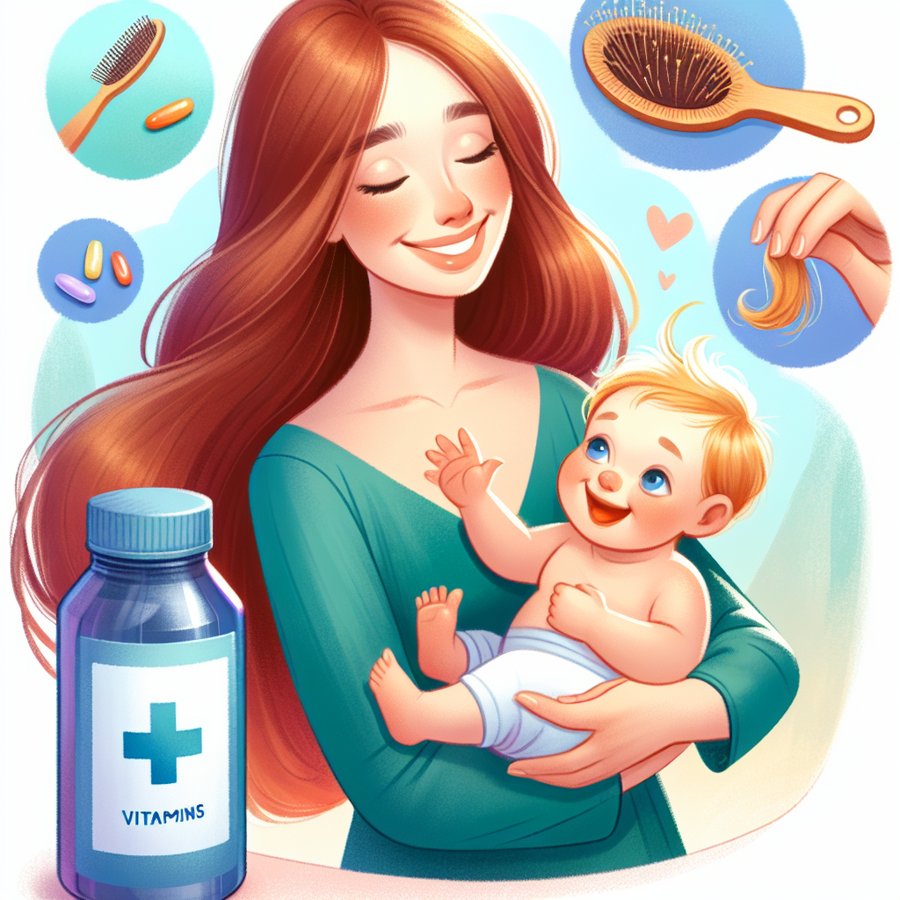Postnatal vitamins for hair loss have become a beacon of hope for many new mothers navigating the often tumultuous postpartum period. As someone who’s been through the postpartum journey, I understand the physical and emotional rollercoaster it can be. Hair loss after pregnancy is a common issue that can dent a new mother’s self-esteem. But, what if I told you that postnatal vitamins could be your ally in this battle? Let’s dive deep into this topic, exploring how these vitamins can help, sharing personal anecdotes, and offering a well-rounded perspective on postnatal care.
What Causes Postpartum Hair Loss?
Before delving into the solution, it’s crucial to understand the problem. Postpartum hair loss, medically known as telogen effluvium, is a temporary condition experienced by many women. It typically begins about three months after childbirth. This phenomenon is largely attributed to the hormonal changes a woman’s body undergoes after giving birth. During pregnancy, elevated estrogen levels prolong the growing phase of hair, leading to thicker, more luscious locks. However, post-delivery, these hormone levels plummet, causing the hair to shift into the shedding phase. While it’s a natural process, it can be alarming and affect a mother’s self-image.
Can Postnatal Vitamins Alleviate Hair Loss After Pregnancy?
Now, onto the beacon of hope—postnatal vitamins for hair loss. These supplements are designed to fill any nutritional gaps in a new mother’s diet, which is crucial for not just hair health, but overall well-being. They typically contain vitamins and minerals essential for hair growth, such as Vitamin B complex, Vitamin D, iron, and zinc. But do they work? Evidence suggests that ensuring adequate intake of these nutrients can support hair health and potentially reduce the severity of postpartum hair loss. It’s not a magic pill, but when combined with a balanced diet, it can certainly make a difference.
What Are the Best Postnatal Vitamins for Hair Loss?
Finding the right postnatal vitamin for hair loss can feel like searching for a needle in a haystack. However, the key is to look for supplements that are comprehensive and tailored to postpartum needs. A good start is to choose vitamins that are rich in the nutrients previously mentioned. Personally, I found a marked difference in my hair health when I focused on iron and Vitamin B complex supplements, as my postpartum blood work showed I was deficient in these areas. Remember, it’s always best to consult with a healthcare provider before starting any new supplement, especially during the postpartum period.
How Can You Incorporate Postnatal Vitamins into Your Daily Routine?
Incorporating postnatal vitamins into your daily routine doesn’t have to be complicated. For me, it was about setting a reminder each morning until it became a part of my regular routine. Pairing the vitamin intake with a consistent part of your day, such as breakfast or a mid-morning snack, can help ensure you don’t forget. Additionally, choosing a vitamin format that you’re comfortable with, whether it’s a pill, gummy, or liquid, can make the process smoother. Remember, consistency is key to seeing benefits.
Through my journey, I also discovered the importance of managing expectations. Postnatal vitamins for hair loss are a supplement, not a cure-all. They work best as part of a holistic approach to postpartum recovery, which includes a nutritious diet, adequate hydration, and, where possible, stress management. In a way, taking your postnatal vitamins can act as a daily reminder to care for yourself, too.
What Other Strategies Can Support Hair Health Post-Pregnancy?
While postnatal vitamins for hair loss play a role, there are other strategies that can support hair health post-pregnancy. Gentle hair care practices, such as avoiding tight hairstyles and minimizing heat styling, can prevent additional stress on your hair. Additionally, maintaining a balanced diet rich in fruits, vegetables, lean proteins, and healthy fats can support overall health, including that of your hair. Lastly, seeking support from a trusted hairstylist or a dermatologist experienced in postpartum hair issues can provide personalized advice and reassurance.
In conclusion, postnatal vitamins for hair loss are a valuable tool in the arsenal of postpartum recovery strategies. They offer a simple way to support your body as it adjusts back to its pre-pregnancy state. However, it’s the combination of good nutrition, gentle hair care, and, importantly, patience and self-compassion that ultimately paves the way for regaining your hair’s health. And remember, the postpartum period is not just about bouncing back; it’s about moving forward into motherhood with strength and grace.













